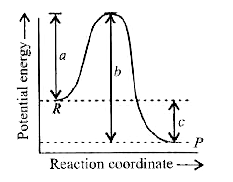Heat of reaction (ΔH) is given by
A
ΔH=(Ea)f−(Ea)b
B
ΔH=BER−BEP)
C
ΔH=HP−HR
D
All the above
Video Solution
Text Solution
The correct Answer is:D
Standard definition
|
Similar Questions
Knowledge Check
For which of the following reactions heat of formation (ΔfH) is equal to ΔH/2 ?
AN2+O2→2NO,ΔH=X1BCO+O2→CO2,ΔH=X2CPCl3+Cl2→PCl5,ΔH=X3DC+O2→CO2,ΔH=X4The heat of a chemical reaction is given by the following expression, ______ .
AΔH=ΣHR−ΣHPBΔH=ΣHRCΔH=ΣHP−ΣHRDΔH=ΣHPHeat of reaction is the change in enthalpy or internal energy as represented by a balanced thermochemical equation . The amount of energy released during a chemical change depends upon the state of reactants and products, the conditions of pressure and volume at which reaction is carried out, and temperature. The variation of heat of reaction (ΔH1orΔE) with temperature is given as ΔH2−ΔH1=ΔCP[T2−T1]orΔE2−ΔE1=ΔCv(T2−T1. Standard heat enthalpy of elements in their most stable state is assumed to be zero whereas standard heat enthalpy of compound is referred as heat of formation of that compound at 1atm pressure and 25∘C. Oxidation of N2 to N2O,NO,NO2 shows absorption of energy whereas heat of combustion of N2 is exothermic like other heat of combustion.
Standard heat enthalpy has been assumed to be zero for :AgraphiteBdiamondCcharcoalDlamp black
If ΔHf(X), ΔHf(Y), ΔHf(R) and ΔHf(S) denote the enthalpies of formation of X, Y, R and S respectively, the enthalpy of the reaction X+Y→R+S is given by
View SolutionEnthalpy of reaction ΔH is expressed as
View SolutionFor the reaction
H2+I2⇔2NHI, ΔH=12.40kcal. The heat of formation (ΔH) of HI is
View SolutionThe variation of heat of reaction with temperature is given
View SolutionThe potential energy diagram for the reaction
R→P is given below:

ΔH∘ of the reaction corresponds to the energy
View Solution
